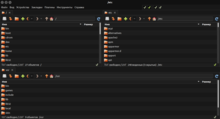Loading AI tools
Graphical file manager for Linux From Wikipedia, the free encyclopedia
SpaceFM was a desktop-independent, multi-panel, tabbed file manager for Linux. SpaceFM is built using the GTK+ toolkit. Available under the terms of the GNU General Public License, SpaceFM is free software.[2]
 SpaceFM | |
| Developer(s) | IgnorantGuru |
|---|---|
| Stable release | 1.0.6[1]
/ 4 March 2018 |
| Repository | |
| Written in | C |
| Operating system | Unix-like |
| License | GPLv3 |
| Website | ignorantguru |
SpaceFM was originally developed from a fork of the legacy PCMan File Manager and later PCManFM-Mod. The internal virtual filesystem (VFS), was retained and extended.[4]
Due to the extensive changes in many parts of the project, SpaceFM was released with its new name as an alpha test version in January 2012.
In version 0.7.5, April 2012, SpaceFM replaced udisks with direct udev support for device detection and information. It also supported multiple mount solutions including udevil (a mount program developed specifically for SpaceFM), pmount, udisks v1 or v2, or any program. This update also allowed for support of network filesystems.
In October 2012, the GTK3 version of SpaceFM was introduced, which supports GTK2 or GTK3.
Subsequent improvements include extending the features of SpaceFM's Desktop Manager, a new Menu Item Properties dialog for adding and customizing menu items, socket commands for interacting with a running instance, and an improved panel configuration memory.
As of December 2022, SpaceFM is unmaintained software, with more than 200 open issues.[5]
Seamless Wikipedia browsing. On steroids.
Every time you click a link to Wikipedia, Wiktionary or Wikiquote in your browser's search results, it will show the modern Wikiwand interface.
Wikiwand extension is a five stars, simple, with minimum permission required to keep your browsing private, safe and transparent.